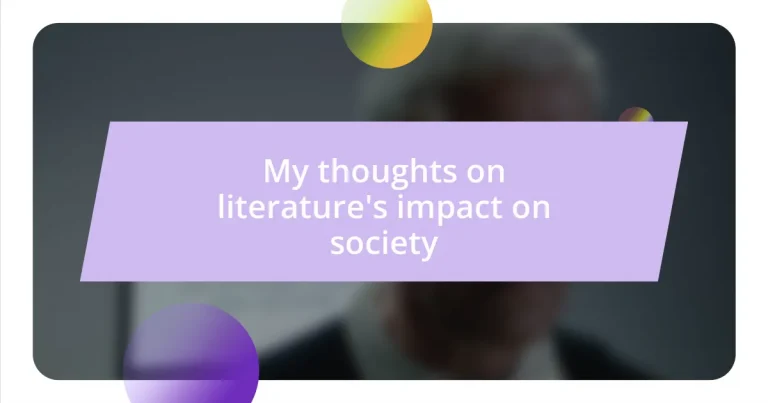Key takeaways:
- Literature acts as a catalyst for social change, promoting empathy and prompting real-world activism through narratives like “1984” and “The Handmaid’s Tale.”
- It fosters critical thinking and a broader worldview in education by introducing diverse cultures and perspectives, as seen in works like “Half of a Yellow Sun.”
- Literature cultivates empathy by allowing readers to connect with varied experiences, encouraging compassion and understanding of complex societal issues.
- Engaging with socially aware literature inspires advocacy for justice, empowering readers to confront and challenge societal norms and injustices.
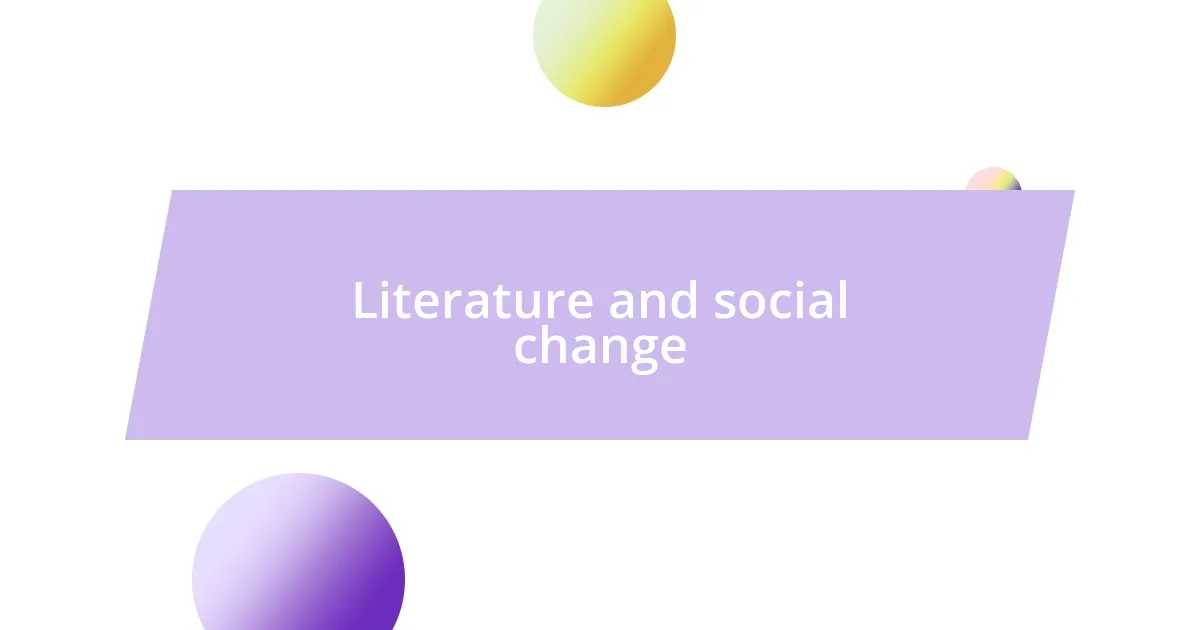
Literature and social change
Literature has always held a mirror to society, reflecting its values, struggles, and aspirations. I remember reading George Orwell’s “1984” in high school and feeling both frightened and empowered. It’s fascinating how that book ignited a genuine conversation about surveillance and freedom, prompting my friends and me to question the boundaries of privacy even in our digital age. Could a single story have the power to shift our perspectives so dramatically?
When I think about literature as a catalyst for social change, I can’t help but recall my own book club’s discussion of “The Handmaid’s Tale.” The emotion in the room was palpable as we dissected themes of oppression and resistance. Those discussions didn’t just stay in the pages; they spurred us to engage more actively with the world around us. Isn’t it incredible that a fictional narrative can provoke real-world activism and awareness?
Ultimately, literature’s role in sparking social change often hinges on its ability to humanize complex issues. For instance, novels like “To Kill a Mockingbird” opened my eyes to the injustices of racial inequality, leveraging empathy to inspire action. I still feel that emotional charge when I reflect on the characters and their struggles. How much more power does a story hold when it connects us to the very human experiences behind systemic issues?
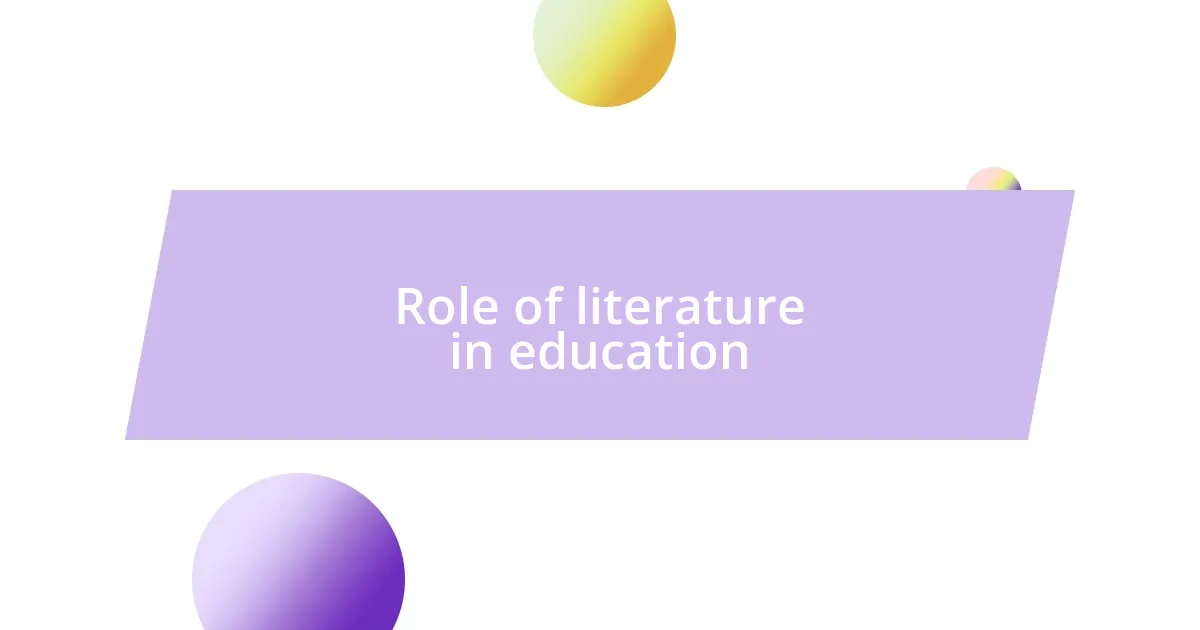
Role of literature in education
Literature plays a pivotal role in education by fostering critical thinking and empathy among students. I can vividly recall my literature classes, where we deeply analyzed texts and explored the motivations of characters. This wasn’t just about identifying themes; it was about understanding the complexities of human nature. The discussions often lingered with me long after class, prompting me to reflect on my own beliefs and biases. Have you ever felt that spark of realization when a character’s struggle mirrored your own?
Another significant aspect of literature’s role in education is its ability to introduce students to diverse cultures and perspectives. I remember reading Chimamanda Ngozi Adichie’s “Half of a Yellow Sun” in a college course. The way it brought to life the Nigerian Civil War allowed me to appreciate a culture and history vastly different from my own. This process of immersion can cultivate a broader worldview and encourage students to think beyond their immediate surroundings. Isn’t it remarkable how a book can transport us to another time and place, transforming our understanding of the world?
Finally, literature often ignites a passion for lifelong learning and inquiry. I find it fascinating how a well-written novel can leave me yearning for more knowledge about the themes it explores, whether they’re historical, philosophical, or social. After reading “Pride and Prejudice,” I dove into the world of Regency-era England, fascinated by how societal norms shaped relationships. This quest for knowledge sparked by literature not only deepens our understanding but also fuels a love for learning that extends beyond the classroom. Isn’t that what education should inspire in all of us?
| Role of Literature | Impact on Education |
|---|---|
| Promotes Critical Thinking | Encourages deep analysis and reflection |
| Introduces Diverse Perspectives | Fosters empathy and cultural appreciation |
| Inspires Lifelong Learning | Cultivates curiosity and a desire for exploration |
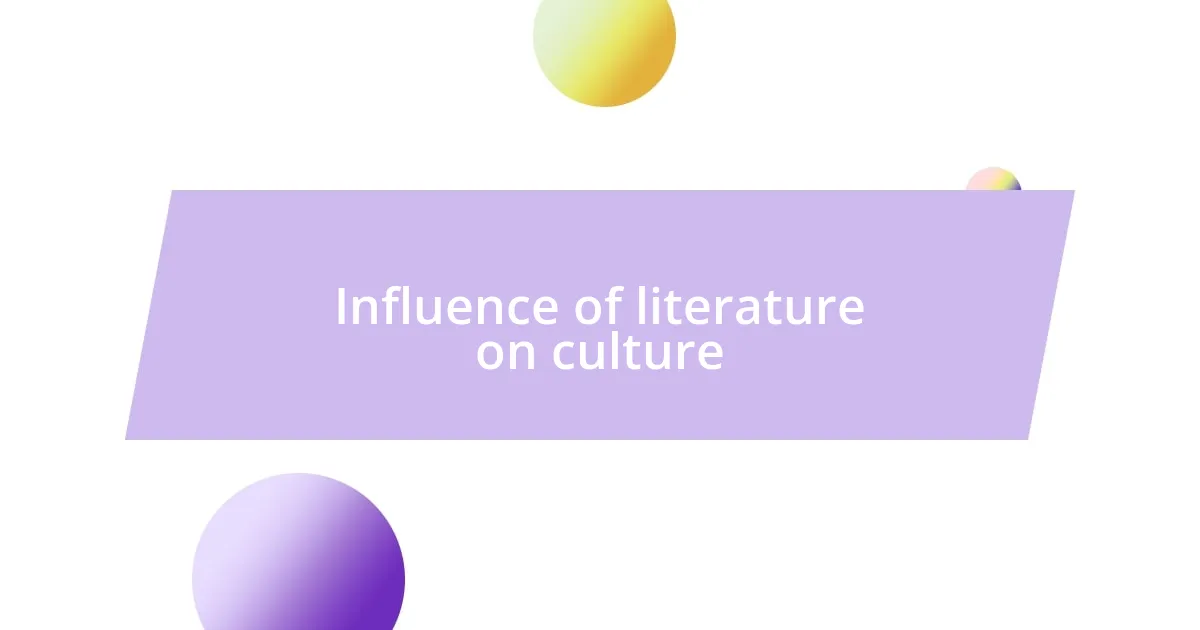
Influence of literature on culture
Literature weaves itself into the fabric of culture, shaping social norms and shared values. I vividly recall a time when I stumbled upon Gabriel Garcia Marquez’s “One Hundred Years of Solitude.” The magic realism swept me into the heart of Latin American culture, showcasing how histories and myths intertwine. It sparked a curiosity in me to explore more about cultural narratives, leaving me pondering: how many untold stories shape our understanding of each other?
- Literature acts as a cultural record, preserving the beliefs and practices of societies.
- It fosters a sense of identity and belonging, connecting individuals to their heritage.
- Literature can challenge stereotypes, promoting acceptance and understanding among diverse communities.
When I think of cultural festivals inspired by literature, I can’t help but reminisce about a local event where we celebrated works of Indigenous authors. Being surrounded by storytelling from various tribal perspectives was not just enlightening; it filled me with pride and joy to be part of a community that valued such rich narratives. In that moment, I realized how literature not only sparks dialogue but builds bridges between cultures, fostering unity and respect. Isn’t it powerful how a collection of words can bring a community together?

Literature’s role in empathy
Literature serves as a powerful tool for cultivating empathy by allowing readers to step into the shoes of characters whose lives and struggles are often vastly different from their own. I still remember the first time I read “The Kite Runner” by Khaled Hosseini. It opened my eyes to the complexities of friendship, betrayal, and redemption amidst the backdrop of war-torn Afghanistan. This story made me realize that experiences of pain and joy are universal, encouraging me to see the world through someone else’s eyes. How often do we find ourselves relating to a character’s heartbreak or triumph despite our differing backgrounds?
Engaging with diverse narratives sharpens our emotional intelligence. When I read “The Help” by Kathryn Stockett, I felt deeply affected by the injustices portrayed through the lives of African American maids in the 1960s South. Their voices and experiences resonated with me, igniting a sense of compassion that lingered long after I turned the last page. I found myself questioning — how can a single story prompt us to reflect on societal issues with such tenderness and depth? It’s this unique ability of literature to evoke empathy that often inspires us to advocate for change in our own communities.
Literature also offers a safe space for exploring complex emotions and uncomfortable truths. After diving into “The Bell Jar” by Sylvia Plath, I was profoundly impacted by the exploration of mental illness and isolation. It led me to understand that many people silently struggle with their own demons. I often wonder, how can we foster deeper connections if we shy away from these discussions? Literature courageously lifts the veil on hard subjects, making it possible for us to talk about our feelings and encourage empathy among ourselves. Isn’t it fascinating how a few written words can inspire such profound connections?
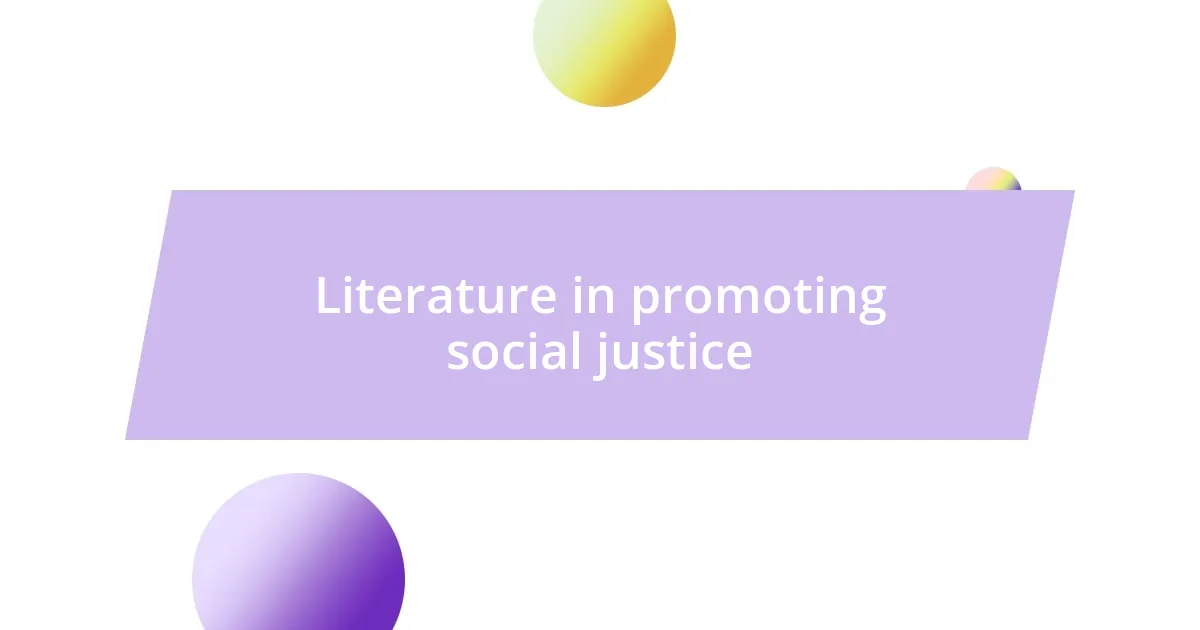
Literature in promoting social justice
Literature has played a pivotal role in calling attention to social injustices, pushing readers to confront uncomfortable realities. I recall reading “To Kill a Mockingbird” by Harper Lee; its portrayal of racial inequality and moral integrity left me grappling with deep questions about justice and humanity. How often do we overlook the injustices happening right under our noses? It illuminated the often-ignored narratives of marginalized communities and inspired me to seek out more literature that challenges societal norms.
As I delved into texts like “The Color Purple” by Alice Walker, I felt an emotional wave that forced me to reckon with issues of gender and race that continue to prevail today. The powerful resilience of the characters stood as a testament to the strength found in adversity. Hasn’t literature always had the ability to spark conversations on topics that matter? For me, stories like these aren’t just narratives; they serve as calls to action, urging readers to stand up against discrimination and advocate for change.
Engaging with literature that addresses social justice can ignite a fire within us, making us more aware citizens. When I participated in a community book club focused on works that explore systemic inequalities, I was amazed by the diverse perspectives shared. It was refreshing to see how each participant connected with the texts on differing levels, fostering dialogue that empowered us to think critically about our roles in society. How can reading such narratives not encourage action? I find it genuinely inspiring that through literature, we develop the courage to challenge injustices and push for a more equitable world.












